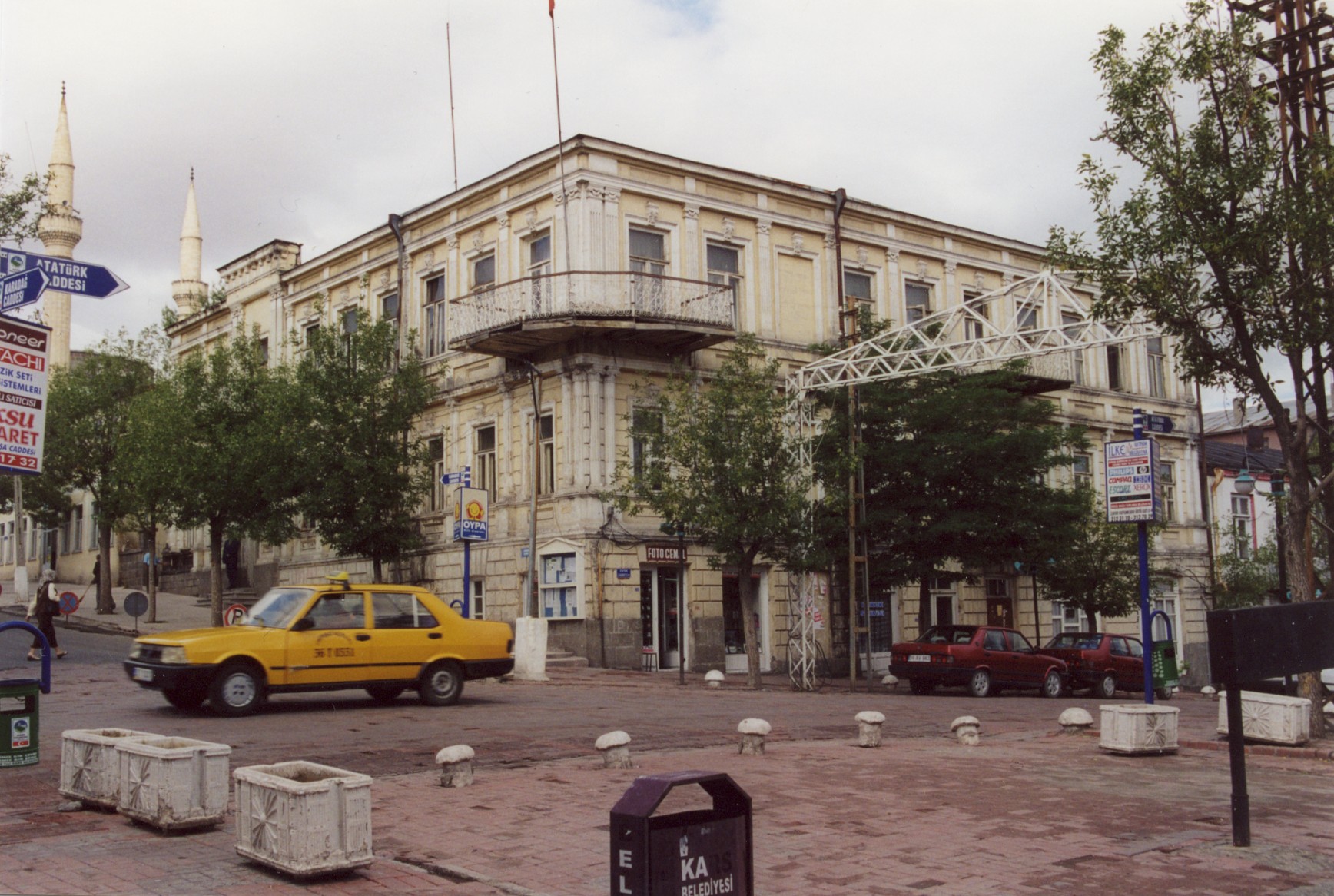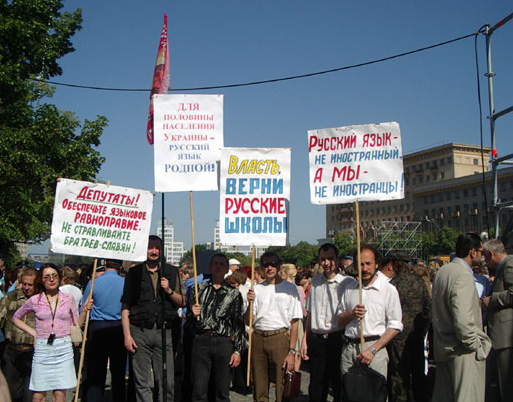|
Language Ombudsman (Ukraine)
In Ukraine, the State Language Protection Commissioner ( uk, –Θ–Ω–Ψ–≤–Ϋ–Ψ–≤–Α–Ε–Β–Ϋ–Η–Ι –£–Β―Ä―Ö–Ψ–≤–Ϋ–Ψ―½ –†–Α–¥–Η –Ζ –Ζ–Α―Ö–Η―¹―²―É –¥–Β―Ä–Ε–Α–≤–Ϋ–Ψ―½ –Φ–Ψ–≤–Η), informally Language Ombudsman ( uk, –Φ–Ψ–≤–Ϋ–Η–Ι –Ψ–Φ–±―É–¥―¹–Φ–Α–Ϋ) is a state official in charge of the enforcement of the law of Ukraine "" (2019), as an element of derussification (minimization the influence of the Russian language in Ukraine) and increase the usage of the Ukrainian language, which is the only state language in the country. Commissioner's duties Commissioner's tasks are defined as follows: * protection of Ukrainian as the state language; * protection of the right of Ukrainian citizens to receive information and services in the spheres of public life in the state language on the whole territory of Ukraine and removal of any obstacles and restrictions in using the state language. In order to fulfill these tasks, the Commissioner: * submits proposals to the Cabinet of Ministers concerning state lan ... [...More Info...] [...Related Items...] OR: [Wikipedia] [Google] [Baidu] |
Ukraine
Ukraine ( uk, –Θ–Κ―Ä–Α―½–Ϋ–Α, UkraΟ·na, ) is a country in Eastern Europe. It is the second-largest European country after Russia, which it borders to the east and northeast. Ukraine covers approximately . Prior to the ongoing Russian invasion, it was the eighth-most populous country in Europe, with a population of around 41 million people. It is also bordered by Belarus to the north; by Poland, Slovakia, and Hungary to the west; and by Romania and Moldova to the southwest; with a coastline along the Black Sea and the Sea of Azov to the south and southeast. Kyiv is the nation's capital and largest city. Ukraine's state language is Ukrainian; Russian is also widely spoken, especially in the east and south. During the Middle Ages, Ukraine was the site of early Slavic expansion and the area later became a key centre of East Slavic culture under the state of Kievan Rus', which emerged in the 9th century. The state eventually disintegrated into rival regional po ... [...More Info...] [...Related Items...] OR: [Wikipedia] [Google] [Baidu] |
Derussification
Derussification (or derussianization) is a process or public policy in different states of the former Russian Empire and the Soviet Union or certain parts of them, aimed at restoring national identity of indigenous peoples: their language, culture and historical memory, lost due to Russification. The term can be also used to describe the marginalization of the language, culture and other attributes of the Russian-speaking society through the promotion of other, usually autochthonous, languages and cultures. After the collapse of the Russian Empire For the first time, Derussification manifested itself in the newly independent states that emerged after the collapse of the Russian Empire in 1917, such as Poland, Finland, Georgia, Estonia, Latvia, and Lithuania. In this case, it often constituted discrimination against the Russian language as a reaction of the peoples conquered in the past to a period of intense (sometimes violent) Russification. Kars After the Treaty of Mosc ... [...More Info...] [...Related Items...] OR: [Wikipedia] [Google] [Baidu] |
Russian Language In Ukraine
Russian is the most common first language in the Donbas and Crimea regions of Ukraine and the city of Kharkiv, and the predominant language in large cities in the eastern and southern portions of the country. The usage and status of the language is the subject of political disputes. Ukrainian is the country's only state language since the adoption of the 1996 Constitution, which prohibits an official bilingual system at state level but also guarantees the free development, use and protection of Russian and other languages of national minorities. In 2017 a new ''Law on Education'' was passed which restricted the use of Russian as a language of instruction. Nevertheless, Russian remains a widely used language in Ukraine in pop culture and in informal and business communication. History of Russian language in Ukraine The East Slavic languages originated in the language spoken in Rus in the medieval period. Significant differences in spoken language in different regions began a ... [...More Info...] [...Related Items...] OR: [Wikipedia] [Google] [Baidu] |
Ukrainian Language
Ukrainian ( uk, ―É–Κ―Ä–Α―½Χ¹–Ϋ―¹―¨–Κ–Α –Φ–ΨΧ¹–≤–Α, translit=ukrainska mova, label=native name, ) is an East Slavic language of the Indo-European language family. It is the native language of about 40 million people and the official state language of Ukraine in Eastern Europe. Written Ukrainian uses the Ukrainian alphabet, a variant of the Cyrillic script. The standard Ukrainian language is regulated by the National Academy of Sciences of Ukraine (NANU; particularly by its Institute for the Ukrainian Language), the Ukrainian language-information fund, and Potebnia Institute of Linguistics. Comparisons are often drawn to Russian, a prominent Slavic language, but there is more mutual intelligibility with Belarusian,Alexander M. Schenker. 1993. "Proto-Slavonic," ''The Slavonic Languages''. (Routledge). pp. 60βÄ™121. p. 60: " hedistinction between dialect and language being blurred, there can be no unanimity on this issue in all instances..."C.F. Voegelin and F.M. Voegelin. 19 ... [...More Info...] [...Related Items...] OR: [Wikipedia] [Google] [Baidu] |
State Language
An official language is a language given supreme status in a particular country, state, or other jurisdiction. Typically the term "official language" does not refer to the language used by a people or country, but by its government (e.g. judiciary, legislature, and/or administration). 178 countries recognize an official language, 101 of them recognizing more than one. The government of Italy made Italian official only in 1999, and some nations (such as the United States, Mexico and Australia) have never declared de jure official languages at the national level. Other nations have declared non-indigenous official languages. Many of the world's constitutions mention one or more official or national languages. Some countries use the official language designation to empower indigenous groups by giving them access to the government in their native languages. In countries that do not formally designate an official language, a ''de facto'' national language usually evolves. English is the ... [...More Info...] [...Related Items...] OR: [Wikipedia] [Google] [Baidu] |
Government Of Ukraine
The Cabinet of Ministers of Ukraine ( uk, –ö–Α–±―•–Ϋ–Β―² –€―•–Ϋ―•―¹―²―Ä―•–≤ –Θ–Κ―Ä–Α―½–Ϋ–Η, translit=Kabinet Ministriv Ukrainy; shortened to CabMin), commonly referred to as the Government of Ukraine ( uk, –Θ―Ä―è–¥ –Θ–Κ―Ä–Α―½–Ϋ–Η, ''Uriad Ukrainy''), is the highest body of state executive power in Ukraine. As Cabinet of Ministers of the Ukrainian SSR, it was formed on 18 April 1991, by the Law of Ukrainian SSR No.980-XII. Vitold Fokin was approved as the first Prime Minister of Ukraine. The cabinet is a collegiate body consisting of the cabinet's "presidium" composed of the Prime Minister of Ukraine and their vice prime ministers as well as other ministers who participate and vote on sessions of the cabinet. The prime minister presides over the cabinet. Some vice prime ministers may be appointed as the first vice prime ministers. Unlike the Soviet period of the government when presidium was actually a functioning institution, the current government presidium is nominal and vice ... [...More Info...] [...Related Items...] OR: [Wikipedia] [Google] [Baidu] |
Legal Person
In law, a legal person is any person or 'thing' (less ambiguously, any legal entity) that can do the things a human person is usually able to do in law βÄ™ such as enter into contracts, sue and be sued, own property, and so on. The reason for the term "''legal'' person" is that some legal persons are not people: companies and corporations are "persons" legally speaking (they can legally do most of the things an ordinary person can do), but they are not people in a literal sense. There are therefore two kinds of legal entities: human and non-human. In law, a human person is called a ''natural person'' (sometimes also a ''physical person''), and a non-human person is called a ''juridical person'' (sometimes also a ''juridic'', ''juristic'', ''artificial'', ''legal'', or ''fictitious person'', la, persona ficta). Juridical persons are entities such as corporations, firms (in some jurisdictions), and many government agencies. They are treated in law as if they were persons. Whil ... [...More Info...] [...Related Items...] OR: [Wikipedia] [Google] [Baidu] |
Politics Of Ukraine
The politics of Ukraine take place in a framework of a semi-presidential republic and of a multi-party system. A Cabinet of Ministers exercises executive power (jointly with the president until 1996). Legislative power is vested in Ukraine's parliament, the Verkhovna Rada ( uk, –£–Β―Ä―Ö–Ψ–≤–Ϋ–Α –†–Α–¥–Α, translation=Supreme Council). As part of the Soviet Union as the Ukrainian Soviet Socialist Republic until 1991, the political system featured a single-party socialist-republic framework characterized by the superior role of the Communist Party of Ukraine (CPU), the sole-governing party then permitted by the Ukrainian SSR's constitution. In 1996, the current constitution replaced the previous constitution that was introduced in 1978. From 2014 changes in the administration on-the-ground in Crimea, Donetsk and Luhansk have complicated the ''de facto'' political situation associated with those areas. Constitution and fundamental freedoms Shortly after becoming independent in ... [...More Info...] [...Related Items...] OR: [Wikipedia] [Google] [Baidu] |




